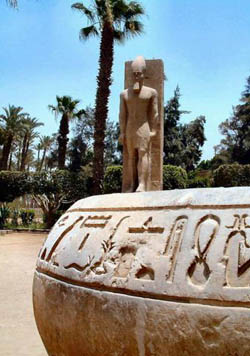Memphis
Memphis was the ancient capital of the first nome
of Lower Egypt, and of the Old Kingdom of Egypt from its foundation
until around 1300 BC. Its Ancient Egyptian name was Ineb Hedj
("The White Walls"). The name "Memphis" is the Greek deformation
of the Egyptian name of Pepi I's (VIth dynasty) pyramid, Men-nefer,
which became Menfe in Coptic. The modern cities and towns
of Mit Rahina, Dahshur, Saqqara, Abusir, Abu Ghurab and Zawyet
El Aryan, south of Cairo, all lie within the administrative
borders of historical Memphis (29°50'58.8"N, 31°15'15.4"E).
Memphis was also known in Ancient Egypt as Ankh Tawy ("That
which binds the Two Lands"), thus stressing the strategic
position of the city between Upper and Lower Egypt.
The ruins of Memphis are 19 km (12 miles) south of
Cairo, on the West Bank of the Nile.
 |
Heiroglyphs in Memphis |
The city was founded around 3100 BC by Menes of Tanis,
who united the two kingdoms of Egypt; with some 30,000 inhabitants,
it was by far the largest settlement worldwide from the time
of its foundation until around 2250 BC and from 1557 to 1400
BC. Memphis reached a peak of prestige under the 6th Dynasty
as a centre of the cult of Ptah. It declined briefly after
the 18th Dynasty with the rise of Thebes and was revived under
the Persian satraps before falling into firm second place
following the foundation of Alexandria. Under the Roman Empire,
Alexandria remained the most important city. It remained the
second city of Egypt until the establishment of Al Fustat
(or Fostat) in 641. Memphis was then largely abandoned and
became a source of stone for the surrounding settlements.
It was still an imposing set of ruins in the 12th century
but soon became little more than an expanse of low ruins and
scattered stone.
The remains of the temple of Ptah and of Apis have
been uncovered at the site as well as a few statues, including
two four metre ones in alabaster of Ramesses II. The Saqqara
necropolis is close to Memphis. The Greek historian Manetho
referred to Memphis as Hi-Ku-P'tah ("Place of the Ka of Ptah")
giving us the Latin AEGYPTVS and the modern English Egypt.
The term Copt is also believed to be etymologically derived
from this name.
In the Bible Memphis is called Moph or Noph.